#Lorenz Karls
Explore tagged Tumblr posts
Text
Finale del 74° Concorso Internazionale di Musica "G.B. Viotti": Giovani Talenti in Competizione sul Palco di Vercelli
Hyun Seo Kim, Lorenz Karls e Mariam Abouzahra si sfidano per il primo premio in una serata di musica imperdibile.
Hyun Seo Kim, Lorenz Karls e Mariam Abouzahra si sfidano per il primo premio in una serata di musica imperdibile. Il 19 ottobre 2024, il Teatro Civico di Vercelli ospiterà la finale del 74° Concorso Internazionale di Musica “G.B. Viotti”, dove tre talentuosi violinisti si contenderanno il prestigioso primo premio. Questo evento è particolarmente significativo poiché coincide con il bicentenario…
#bicentenario Viotti#Brahms#competizione musicale#competizioni internazionali#concerti celebri.#concerti per violino#Concorso Viotti#Eventi culturali#Finale#Francesco Ommassini#giovani violinisti#Giovanni Battista Viotti#giuria internazionale#Hyun Seo Kim#Jean Sibelius#Lorenz Karls#Mariam Abouzahra#Musica Classica#musica da concerto#Musica dal vivo#musica europea#Orchestra Sinfonica di Milano#Paolo Pomati#PERFORMANCE#Pietro Borgonovo#streaming YouTube#talenti emergenti#Tchaikovsky#Teatro civico#trasmissione in diretta
0 notes
Text
Valentine’s Day 2024 Lines — Antiques
Enfield
Friend Chocolate: Thank you very much! The truth is, I’ve been writing a poem to show my thanks... I’ll be ready to unveil it by next year, I believe. Yes, indeed!
Dear Chocolate: “The shining beams of daybreak’s sun // The flowers blooming full // Let’s pick one for our love, you and I, // and from dawn to dusk, give thanks for this fleeting life.”
Snider
Friend Chocolate: ...I don’t want that. I won’t accept anything from you unless it’s special.
Dear Chocolate: You know I don’t eat sweet things, don’t you? Tch... fine, then. You can eat it. And I’ll watch you finish every bite.
George
Friend Chocolate: Wow! This chocolate is so cute!☆ I can tell you put a lot of joy into making it. Thank you~♥
Dear Chocolate: Whoah... this is too good to eat. Oh, I know! Let’s take a picture of the two of us next to the chocolate! It can last forever that way!☆
Kentucky
Friend Chocolate: Oh, this friend chocolate’s super cute! Thanks! Ha, haha... huh, no, I’m not crying! Just tearin’ up a bit from joy!
Dear Chocolate: Th-This, this i-is... Master, from today on, I’ll be goin’ around actin’ like I’m your favorite, y’know. Is that okay?
Pennsylvania
Friend Chocolate: Oh... what a coincidence. I was just thinking I wanted somethin’ sweet to eat. Thank you kindly for the gift.
Dear Chocolate: That looks delicious... thank you. To show my gratitude... hm, a hug wouldn’t be enough. If something sounds good, could’ya tell me...?
Charleville
Friend Chocolate: Wow, what a cute chocolate lollipop! Merci, Master.♥ And here, chocolate-covered dried fruits, from me.♪
Dear Chocolate: Wow, amazing! ...mm! This is the tastiest dessert I’ve ever eaten! Will you make it next year too? And the year after that?
Chassepot
Friend Chocolate: F-Friend chocolate... I see I haven’t done enough to convey my feelings to you... Well, thank you. What a lovely gift...
Dear Chocolate: Master... I was hoping for this. Getting something so special from you...! Ahh, the whole world seems brighter now!
Tabatiere
Friend Chocolate: Haha, what lovely chocolate. I’m usually the one thanking you anyway, but... thank you, really. I’m sure it’ll be delicious.
Dear Chocolate: I get Master-chan’s homemade chocolate all to myself? Haha... you sure this isn’t some kind of mistake? This much happiness might kill me, you know...
Dreyse
Friend Chocolate: Thank you. However... this sort of snack seems rather childish. Wouldn’t I look strange eating it...?
Dear Chocolate: What a wonderful gift...! I hardly know how to express my joy... perhaps a lap around the school with you on my shoulders!
Jitte
Friend Chocolate: Oh, thanks for the lovely gift. Mhmm, a bit of chocolate right now sounds awfully sweet!
Dear Chocolate: Even with so many options... you’re really choosing me? Oh, dear... this is supposed to be romantic, but I’m starting to tear up.
Karl
Friend Chocolate: Oh, chocolate. Thank you. If Margarita were here, this would certainly be a merry day...
Dear Chocolate: Ah— thank goodness. I’d forbidden myself chocolate for the last month in hopes of a gift from you. What a blessing this is... I’ll enjoy it!
Lorenz
Friend Chocolate: My thanks, Test Subject #2. You didn’t forget to prepare some for Karl-sama as well, correct? Make sure his is the best of the bunch.
Dear Chocolate: I had predicted this occurence, and yet... now that it’s happening, why is my heart in such a frenzy!? Do you know the answer, Test Subject #2...!?
Cutlery
Friend Chocolate: You’re giving me friend chocolate? Thanks. Some chocolate from Charlotte came in too. I’m happy to get so much...!
Dear Chocolate: Huh... this is for me!? You’re kidding... I can’t believe it. Getting something like this, I’m amazed... *sob*...!
#Senjuushi#千銃士#Enfield#Snider#George#Kentucky#Pennsylvania#Charleville#Chassepot#Tabatiere#Dreyse#Jitte#Karl#Lorenz#Cutlery#Translation
32 notes
·
View notes
Text

Starting spooky season reading with one of the "Horrid Novels" mentioned in Northanger Abbey, Der Geisterbanner (translated as The Necromancer; or The Tale of the Black Forest).
#der geisterbanner#lorenz flammenberg#karl friedrich kahlert#northanger abbey#jane austen#horrid#gothic literature#gothic#deutsche literatur#dark academia#dark acadamia aesthetic#grey academia#classic academia#books#bücher#bookblr#ἐποίησα
16 notes
·
View notes
Text

PSINK_ANSCHLUSS
Part One in a series: Psychoanalysis and Fascism
#psychiatry#melanie klein#anna freud#alfred adler#karl marx hof#sigmund freud#carl jung#university of vienna childrens hospital#wilhelm reich#hans asperger#konrad lorenz#erwin jekelius#spiegelgrund#steinhof
3 notes
·
View notes
Text
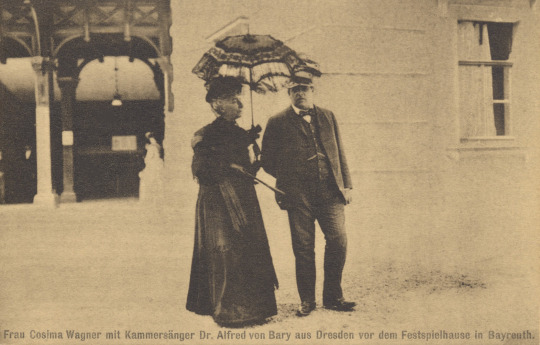
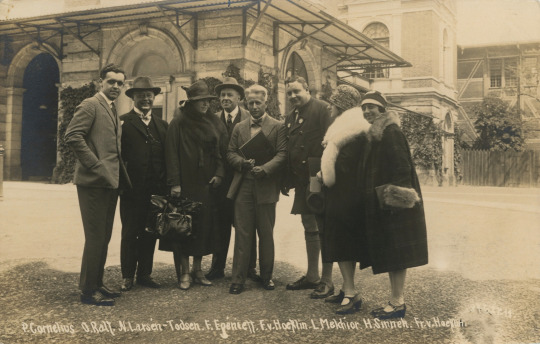
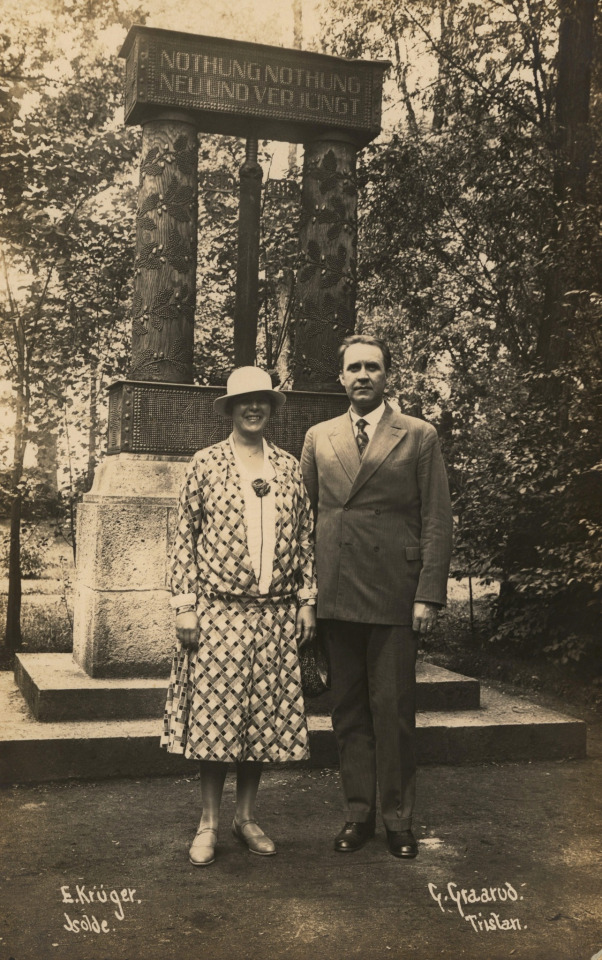
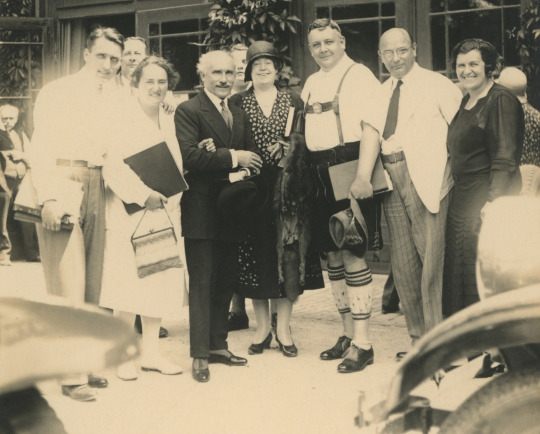

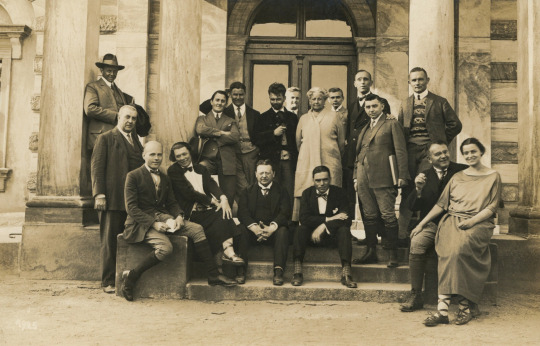
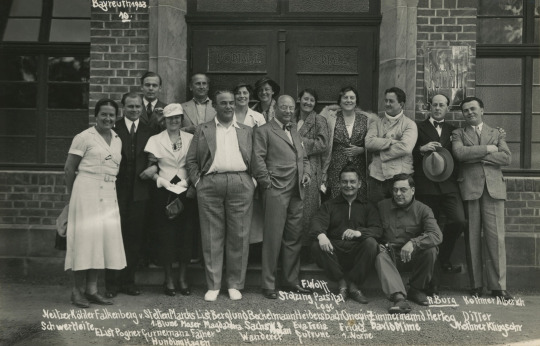
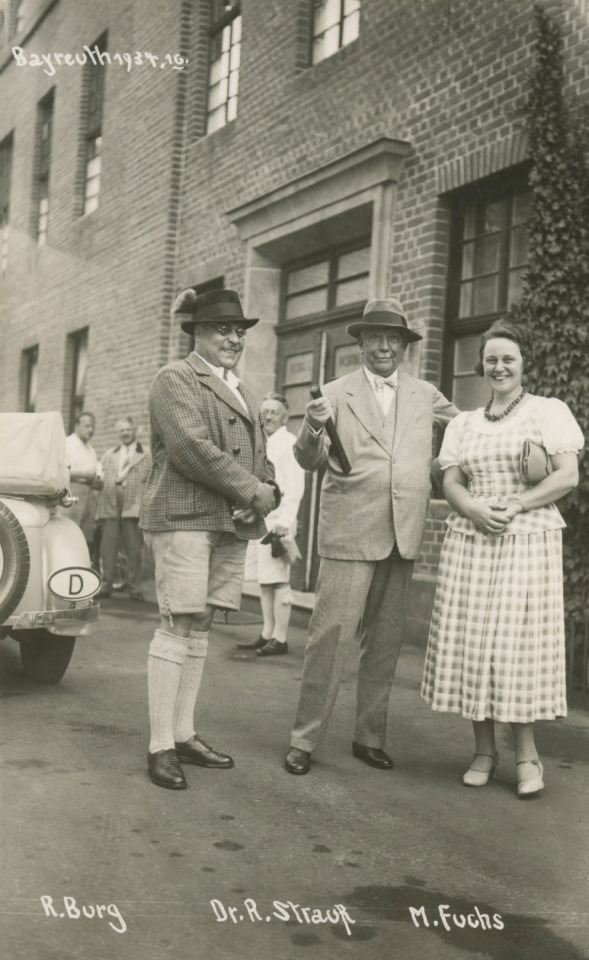
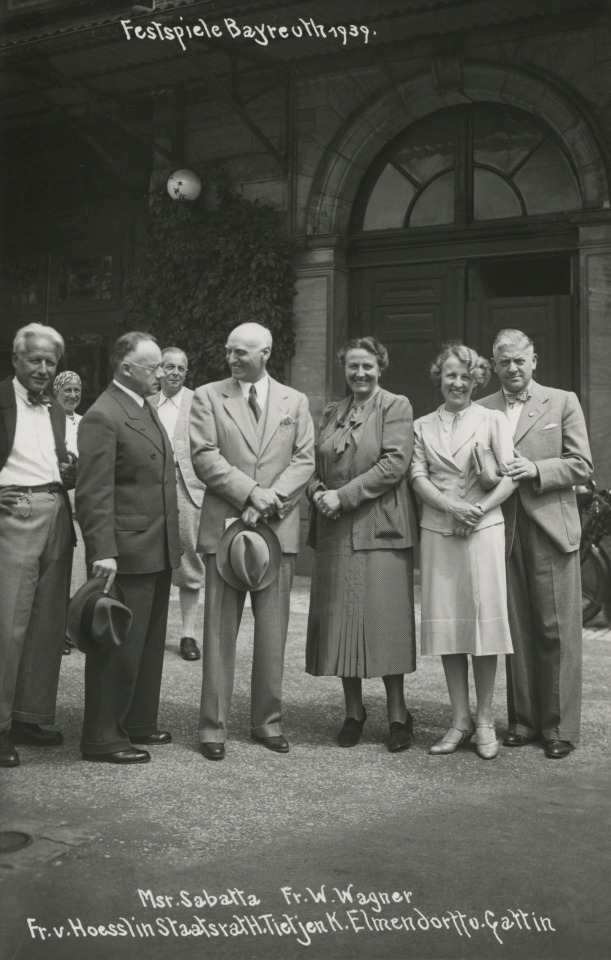



BAYREUTHER BÜHNENFESTSPIELE / BAYREUTH FESTIVAL THE SINGERS IN PICTURES FROM THE EARLY DAYS IN THEIR LEISURE TIME TOGETHER.
Cosima Wagner and Alfred von Bary; Bayreuth, 1906(?)
Peter Cornelius, Oscar Ralf, Nanny Larsén-Todsen, Franz Egenieff, Franz von Hoeslin, Lauritz Melchior, Hilde Sinnek and Hoeslin's wife; Bayreuth, 1927
Emmy Krüger and Gunnar Graarud; Bayreuth, 1927
Tristan's team: Erich Riede, Evelyn Faltis, Arturo Toscanini, Nanny Larsén-Todsen, Lauritz Melchior, Rudolf Bockelmann and Anny Helm; Bayreuth 1930
Gunnar Graarud, Nanny Larsén-Todsen and Karl Elmendorff; Bayreuth, 1930
Maria Ranzow (Ranzenberg), Erik Zimmermann, Louise Reuss-Belce and Fritz Wolff…; Bayreuth, ?
Lilly Neitzer, (? Köhler), (? Falkenberg), Emmy von Stetten, Fritz Marcks, Emmanuel List, Ruth Berglund, Melitta Amerling, Rudolf Bockelmann, Käthe Heidersbach, Sigrid Onegin, Fritz Wolff, Erik Zimmermann, Robert Burg, (? Hertogg?) and Gotthold Ditter; Bayreuth, 1933
Robert Burg, Richard Strauss and Marta Fuchs; Bayreuth, 1934
Franz von Hoesslin, Heinz Tietjen, Victor de Sabata, Winifred Wagner, Karl Elmendorff and wife; Bayreuth, 1939
Margarete Klose, Max Lorenz and ? and ?; Bayreuth, 1941
Margarete Klose, Walter Büttelmann and ?; Bayreuth, 1941
Margarete Klose and husband Walter Büttelmann; Bayreuth, 1941
#classical music#opera#music history#bel canto#composer#classical composer#aria#classical studies#maestro#chest voice#Bayreuther Festspiele#Richard Wagner#Bayreuth Festival#classical musician#classical musicians#classical history#opera history#history of music#historian of music#musicians#musician#diva#prima donna
9 notes
·
View notes
Text
WHAT IF IDV CHAREVTERS WHERE IN A HUNGER GAME AU (undertones of nortnaid and ton to ) (it’s not even undertones it’s kinda like the main thing)
Capitol
- Mary Amilcar (announcer) 😻🦚
- joseph Desaulniers(announcer) 🪦🦚
- michiko (past victor) 😻🦋
- yidhra (game master 75th) 🤩🦋
- Antonio 🪦🦚
- keigan Nicholas Keogh🪦🦚
- sangria 🪦🦚
- hastur (president) 🪦🦚
- Margaretha Zelle (rats on Mikey) 🪦🦚
- Mike Morton 😻🦚
- Victor Grantz😻🦋
- Fredrick 🪦🦚(game master 74th)
- Servius Le roy (peacekeeper) 😻🦚
- Fiona Gilman🪦🦋
- Eli Clark (spy) 🪦🦚
District 1 luxury craft
- Edgar Valden 💀🦋 66th
- Vera Nair 👻🦋
- Galatea Claude👻🦋
- Qi Shiyi (Mentor) 62nd🪦🕊️
District 2 weapons
- Emma woods💀🦋 70th
- Leo beck💀🦋50th
- Wu Chang Xie Bi’an Fan Wujiu👻🦋
- Martha Behamfil (Mentor)😻🦋
District 3 technology revolting
- Luca balsa😻🕊️65th
- fredy Riley👻🦋
- Alva Lorenz💀🦚 56th
- Helena Adams👻🕊️
District 4 fishing revolting
- Luchino Diruse💀🕊️58th
- grace 👻🦋
- Magaretha Zelle👻🦋72nd
- Jose Baden(Mentor) 💀🦋
District 5 power/ electricity
- Tracy Reznik👻🕊️
- Burke Lapadura(Mentor) 💀🕊️ 35th
- Percy Lapadura 💀🦋55th
-Charles (aeroplanist)
District 6 transport
- 1st brother (kaseko will)💀🦋67th
- 2nd brother 😵
- 3rd brother 👻🦋
- joker 💀🦋 59th
- Kurt Frank👻🦋
- Charles holt 😵🦋
District 7 lumber revolting
- Robbie White💀🕊️73rd
- Ganji Gupta💀🦋64th
- Anne Lester👻🦋
- Kreacher Pierson👻🦋
District 8 textile revolting
- Phillippe 👻🦋
- Violetta 👻🕊️
- Aesop Karl (Mentor) 💀🦋69th
- michiko 😻🕊️ 60th
District 9 wheat
- Ann 💀🦋57th
- lucky guy 👻🕊️
- ordinary guy 👻🦋
- Demi Bourbon💀🕊️ 71st
District 10 livestock
- bane Perez💀🕊️ 54th
- Kevin Ayuso💀🦋 61st
- Melly Plinius👻🕊️
- lily Barriere👻🦋
District 11 agriculture revolting
- ithaqua 👻🦋
- William Ellis👻🦋
- Patricia Dorval💀🕊️ 63rd
- Alice/little girl DeRoss😻🕊️68th
District 12 coal
- Norton Campbell 😻🦋74th
- naib subedar 😵���️ 74th
- Emily Dyer(doctor) (23) 🪦🕊️
District 13
- murro 😻🦋
- Andrew Kreiss🪦🕊️
- Emil 😻🕊️
- Ada Mesmer🪦🕊️
-Orpheus (propaganda) 🪦🕊️
KEY:
If they have a number next to their name that is the game year they won.
👻 Dies in 74th game
💀 Dies in 75th game
🪦 Dies during rebellion
😵 Dies because of other stuff
🤩 Survives 74th games
😍 Survives 75th games
😻 Survives the whole thing
🕊️ Rebel Allegiance
🦚 Capitol Allegiance
🦋 Neutral
#identity v#idv fanart#the hunger games#hunger games au#identity 5#norton campbell#naib subedar#idv norton#idv prospector#idv mercenary#idv acrobat#mike morton#tonton#nortnaib#what the hell#what the fuck is wrong with me#I love identity v#I have only watched the movies sorry
4 notes
·
View notes
Text
Send me a kiss prompt from this linked list and any ship on the list below the cut and I'll write something for it!
ETA: I turned on anon for this
note: these are all pairings I can write without calling on my writing partner XD
Digimon
Ken x Daisuke
TK x Ken
TK x Daisuke
Matt x TK
Koushiro x Mimi
Koushiro x Ken
GTA V
Trevor x Tracey
Lester x Trevor
Franklin x Trevor
Ace Attorney
Kavier x Apollo
Phoenix x Miles
Phoenix x Apollo
Phoenix x Mia
Peter Pan
Hook x Smee
Jane x Tinkerbell
Tinkerbell x Hook
Slayers
Zelgadis x Xelloss
Rezo x Kappii
Zelgadis x Kappii
Lina x Zelgadis
Metal Gear Solid
Ocelot x Otacon
Acid Snake x Ocelot
Ocelot x Mantis
Mantis x Otacon
Jem
Eric Raymond x Raya
Eric Raymond x Pizzazz
Eric Raymond x Kimber
Techrat x Riot
Kimber x Riot
Pizzaz x Riot
Rapture x Riot
Kimber x Pizzazz
Craig x Pizzazz
Craig x Jetta
Craig x Riot
TGAA
Kazuma x Ryuunosuke
Yuujin x Kazuma
Yuujin x Ryuunosuke
Barok x Ryuunosuke
Barok x Kazuma
hosonaga x mikotoba
hosonaga x ryuunosuke
barok x hosonaga
drebber x tuspells
drebber x yuujin
drebber x barok
Courtney x drebber
Urusei Yatsura
Mendo x Megane
mendo x ryoko
mendo x shingo
rei x mendo
ataru x mendo
ataru x megane
ataru x rei
Resident Evil
Chris x Wesker
Chris x Tyler
Leon x Tyler
karl x ethan
nikolai x george hamilton
chris x ethan
annette x wesker
heisenberg x chris
heisenberg x wesker
Fire Emblem
Manuela x Hanneman
linhardt x caspar
manuela x dorothea
claude x lorenz
jeritza x mercedes
jeritza x ingrid
jeritza x seteth
jeritza x hanneman
jeritza x yuri
balthus x yuri
bathus x jeritza
seteth x mByleth
byleth x anyone
Claude x Linhardt
Danganronpa
Toko x Nagito
Toko x Syo
Toko x Kirigiri
toko x Hifumi
nekomaru x gundam
nekomaru x teruteru
teruteru x kotoko
kaziuchi x hiyoko
hiyoko x kotoko
asahina x sakura
Marvel
Sabretooth x Otto
Sabretooth x Forge
Sabretooth x Cypher
Sabretooth x Kitty Pryde
Kitty Pryde x Cypher
Kitty Pryde x Otto
Cypher x Otto
Sabretooth x Tabitha
Sabretooth x Banshee
Sabretooth x Toad
Banshee x Northstar
Banshee x Doug
Sabretooth x Logan
Kitty Pryde x Logan
Peter x Harry
Peter x Otto
Peter x Adrian
Adrian x Otto
Harry x Otto
Harry x Adrian
sabretooth x daken
daken x logan
steve x logan
steve x sabretooth
peter x Ben
Ben x Otto
Ben x Harry
magneto x northstar
northstar x sabretooth
Homestuck
Vriska x Aranea
Vriska x Dave
Vriska x Eridan
Vriska x Sollux
Vriska x Equius
Vriska x Cronus
Cronus x Aranea
Aranea x Eridan
Dave x Karkat
bro x dave
dirk x dave
hal x dirk
hal x dave
dirk x vriska
DD x HB
BQ x DD
BQ x HB
dave x sollux
dave x eridan
sollux x eridan
cronus x equius
Kurlox x equius
Persona series
Naoya x Kei
Katsuya x Baofu
Baofu x Dojima
Dojima x Naoto
Yukari x Junpei
Kei x Reiji
kandori x reiji
kandori x kei
chie x yukiko
yu x dojima
yu x chie
yu x yukiko
akira x akechi
akira x ryuji
#writing#writing prompts#ask game#fanfiction#kiss prompts#persona series#urusei yatsura#slayers anime#homestuck#danganronpa#digimon adventure#marvel comics#spider man#jem and the holograms#fire emblem three houses#dai gyakuten saiban#ace attorney#metal gear solid#gta v#resident evil
3 notes
·
View notes
Text
Nachruf auf Karl Popper | Alles Leben ist Problemlösen

Nach einem überaus freundlichen Telefongespräch mit Professor Dr. med. Herbert Csef aus Würzburg hat er sich bereit erklärt, seinen hervorragenden, umfangreichen und die für mich wichtigsten Aspekte von Poppers Werk umfassenden Artikel abzudrucken, was ich nun ungekürzt tue. Prof. Csef und ich sind natürlich Popper-Fans, und wir hoffen, dass sich aus dieser ersten Zusammenarbeit "noch mehr" entwickeln wird. Das wäre schön. Und auch schön ist: Prof. Csef ist unser 50. Gastautor - danke auch dafür. Karl Popper – „Alles Leben ist Problemlösen“. Erinnerungen an den großen Philosophen zum 30. Todestag Am 17. September 1994 ist Karl Popper in London gestorben. Acht Monate vor seinem Tod schrieb er das Vorwort zu einem Sammelband mit dem Titel „Alles Leben ist Problemlösen“, der Aufsätze aus seiner letzten Lebensphase enthält. Dieses letzte Buch, das zu Lebzeiten erschien, widmet sich allgemeinen Lebensthemen, die jeden Menschen interessieren sollten: Freiheit, Demokratie, Frieden, Zukunftsgestaltung, Lebensbewältigung, Hoffnung und Optimismus. Im Vorwort schreibt er, das Buch sei eine Fortsetzung seines Werkes „Auf der Suche nach einer besseren Welt“, das zehn Jahre zuvor erschien. Popper zeigt sich in beiden Werken als hoffnungsvoller Optimist, der durchaus Skepsis und Kritik kennt, in seinem Grundbestreben jedoch immer wieder nach besseren Lösungen für Lebensprobleme sucht. Und der glaubt, dass dies möglich ist. Überblick über das Lebenswerk von Karl Popper Die philosophischen Schwerpunkte von Karl Popper waren die Erkenntnis- und Wissenschaftstheorie, die Sozial- und Geschichtsphilosophie sowie die politische Philosophie. Er gilt als der Begründer des Kritischen Rationalismus. Aus seiner Denkschule stammen zahlreiche Philosophen, die von seinem Denken geprägt waren und später ebenfalls sehr bekannt wurden, wie z.B. Thomas S. Kuhn, Paul Feyerabend, George Soros oder Hans Albert. Mit den Nobelpreisträgern Friedrich August von Hajek, Peter Brian Medawar, Konrad Lorenz, Albert Einstein, John Eccles und Bertrand Russell war er befreundet. Die Philosophen und Politiker Ralf Dahrendorf sowie Bundeskanzler Helmut Schmidt waren eng mit ihm verbunden und hörten gerne auf seinen Rat. Kurzes biografisches Porträt von Karl Popper Sir Karl Popper wurde am 28. Juli 1902 in Wien geboren. Dort verbrachte er seine ersten 35 Lebensjahre. Sein Vater war Rechtsanwalt. Seine Mutter hieß vor der Ehe Jenny Schiff und stammte aus einer bekannten ungarisch-schlesischen Familie mit zahlreichen Ärzten, Wissenschaftlern und Musikern. Der berühmte Dirigent Bruno Walter war mit Poppers Mutter verwandt. Popper hatte sehr vielfältige Interessen. Er studierte an der Universität Wien neben Philosophie auch Mathematik, Geschichte, Musik und Psychologie. Seine Promotion machte er im Fach Psychologie. Sein Doktorvater war Karl Bühler. Seine Dissertation aus dem Jahr 1928 trug den Titel „Zur Methodenfrage der Denkpsychologie“ (vgl. Csef 2024). Karl Popper interessierte sich auch für Pädagogik. Ein zweites Studium absolvierte er eine einige Jahre am Pädagogischen Institut in Wien. Anschließend arbeitete er fünf Jahre lang als Lehrer. Kurz nach seiner Anstellung als Lehrer heiratete er im Jahr 1930 in Wien die 4 Jahre jüngere Josefine Henninger. Seine Ehefrau erkrankte im Jahr 1977 an Krebs und ist nach drei Operationen im Jahr 1985 gestorben (biografische Angaben nach Salamun 2018). Bei einem Englandbesuch lernte er im Jahr 1935 in London seinen österreichischen Landsmann Friedrich August von Hayek kennen. Der drei Jahre ältere Hajek war zu dieser Zeit bereits angesehener Ökonomie-Professor an der renommierten London School of Economics. Popper war damals noch einfacher Hauptschullehrer in Wien. Im Jahr 1937 musste Popper wegen seiner jüdischen Herkunft ins Exil nach Neuseeland fliehen. Er war für 8 Jahre Dozent am Canterbury University College in Christchurch. Hayek und Popper unterhielten einen regen Briefwechsel und Popper las die Bücher von Hayek. Der einflussreiche Hayek schaffte es nach dem Zweiten Weltkrieg, Popper ebenfalls an die London School of Economics zu locken. Dort war er schließlich 20 Jahre lang – von 1949 bis 1969 – Professor für Logik und Wissenschaftslehre. Im Jahr 1992 erhielt er mit dem Kyoto-Preis die höchste Auszeichnung, die ein Philosoph erreichen kann. In seiner Autobiographie „Ausgangspunkte – Meine Entwicklung“, die im Jahr 1976 auf Englisch und 1979 auf Deutsch erschien, bekannte Karl Popper, dass sein Freund Hayek ihm zweimal das Leben gerettet habe. Das erste Mal dadurch, dass nach vielen Ablehnungen seines Hauptwerkes „Die offene Gesellschaft und ihre Feinde“ durch die angefragten Verlage ihm Hayek die Erstpublikation im Londoner Routledge-Verlag ermöglichte. Die zweite Lebensrettung war, als das relativ mittellose Ehepaar Popper durch großen Einsatz von Hayek eine finanzielle Lebensgrundlage erhielt. Hayek vermittelte ihm 1946 eine Dozentenstelle und 1949 eine Professorenstelle an der London School of Economics (Popper 1979). „Die offene Gesellschaft und ihre Feinde“ (Karl Popper) In seinem zweibändigen Grundlagenwerk wendet sich Karl Popper gegen totalitäre Systeme wie Faschismus, Nationalsozialismus und Kommunismus. Geschrieben hat er sein Buch in den Jahren 1938 bis 1943 im Exil in Christchurch. Publiziert wurde es zuerst in englischer Sprache im Londoner Routledge Verlag. Anlass für sein umfangreiches Werk war im Jahr 1938 der Einmarsch von Hitlers Truppen in sein Heimatland Österreich. Die Wurzeln totalitärer Staaten sieht er in problematischen Ideen, die Demokratie und menschenfeindliche Tendenzen fördern. Popper hatte besonders einige Philosophen im Visier, die seiner Meinung nach „falsche Propheten“ sind: Platon, Hegel und Karl Marx sowie ihre Anhänger. Popper unterscheidet offene und geschlossene Gesellschaften. In offenen Gesellschaften werden die Grundrechte von Demokratien verwirklicht wie Meinungs-, Vereinigungs- und Versammlungsfreiheit und religiöse Neutralität. In geschlossenen Gesellschaften wie Diktaturen oder anderen totalitären Systemen sind diese Grundrechte eingeschränkt, weil der Staat von oben einen Rahmen vorgibt und die Regeln festlegt. In offenen Gesellschaften sind die Institutionen veränderbar und in einem ständigen Wandel. Die Ziele einer offenen Gesellschaft sind eine ausreichende Grundversorgung und Gleichberechtigung. Das Leitmotiv von Popper ist nicht die Maximierung von Glück, sondern die Minimierung von Leiden. Karl Popper ist der Verfechter einer liberalen Demokratie, die er für die beste Staatsform hält. Die Publikation seines Hauptwerkes gestaltete sich in der Nachkriegszeit schwierig. Wegen der Kritik an dem sowjetischen Sozialismus gab es politische Widerstände gegen eine Publikation in Deutschland. Die alliierten Besatzungsmächte verweigerten die notwendige Lizenz, um den verbündeten Diktator Stalin nicht zu verärgern. Folglich erschien das Buch mit großer Unterstützung seines Freundes Hayek zuerst in englischer Sprache im Londoner Routledge-Verlag. Erst 12 Jahre später erschien die deutsche Fassung im Münchner Francke-Verlag. „Auf der Suche nach einer besseren Welt“ (1984) In seinem Sammelband „Auf der Suche nach einer besseren Welt“ aus dem Jahre 1984 befinden sich Vorträge, die Karl Popper in 30 Jahren gehalten hat. Da ein Teil dieser ausgewählten Reden und Vorträge nicht vor Akademikern oder Philosophen gehalten wurde, hat sich Popper sehr um eine für alle verständliche Sprache bemüht. Enthalten sind z.B. die Rede zum Jubiläum 25 Jahre österreichischer Staatsvertrag oder zu den Salzburger Festspielen im Jahr 1979. Popper erhielt mehr als 20 Ehrendoktorwürden als Anerkennung für seine herausragenden akademischen Leistungen. Im Jahr 1979 wurde er als Ehrendoktor an den Universitäten Frankfurt am Main und Salzburg ausgezeichnet. Die zu diesem Anlass gehaltenen Vorträge sind ebenfalls abgedruckt. Im Jahr 1983 waren in seinem Heimatland Österreich zwei sehr öffentlichkeitswirksame Ereignisse: das Altenburger Gespräch mit dem Freund und Nobelpreiskollegen Konrad Lorenz im Februar 1983 und das Popper-Symposium zu seinem 80. Geburtstag im Mai 1983 in Wien. Die Vorträge und Diskussionen von beiden Veranstaltungen wurden in einem Sammelband veröffentlicht (Karl Popper und Konrad Lorenz 1985). Im Dezember 1984 hat der damals 82jährige Karl Popper ein Nachwort für dieses Buch geschrieben. Darin teilte er eine wichtige Erkenntnis mit, die als Warnruf für die Zukunft verstanden werden kann: „Wenn es den Menschen sehr gut geht, wird ihnen die freie Atmosphäre zur Selbstverständlichkeit, und sie werden die Wachsamkeit verlieren gegen die Gefahren, die die Freiheit bedrohen. Solange es ehrgeizige, machthungrige Menschen gibt, werden sie deshalb eine allzu glückliche Gesellschaftsform leicht ins Unglück stürzen.“ (Karl Popper 1984, S. 138) Karl Popper war einer der bedeutenden politischen Philosophen des 20. Jahrhunderts, der sich vehement für Freiheit und Demokratie einsetzte. Seit seinem Hauptwerk „Die offene Gesellschaft und ihre Feinde“ warnte er unaufhörlich vor den Feinden der Demokratie und den Gefahren des Totalitarismus. In den aktuellen Bedrohungen anlässlich des Russland-Ukraine-Krieges haben die Warnrufe Poppers universelle Bedeutung. Literatur Csef, Herbert (2024), Karl Popper und die Psychologie. Tabularasa Magazin vom 9. März 2024 Franco, Guiseppe (Hrsg.) (2019), Handbuch Karl Popper. Wiesbaden: Springer VS Verlag Popper Karl (1957), Die offene Gesellschaft und ihre Feinde, Teil 1, Der Zauber Platons, München: Francke Verlag Popper Karl (1958), Die offene Gesellschaft und ihre Feinde, Teil 2, Falsche Propheten: Hegel, Marx und die Folgen, München: Francke-Verlag Popper, Karl (1979), Ausgangspunkte. Meine intellektuelle Entwicklung. Autobiographie. Hamburg: Hoffmann und Campe Verlag Popper, Karl (1984), Auf der Suche nach einer besseren Welt. Vorträge und Aufsätze aus dreißig Jahren. München: Piper Verlag Popper, Karl (1994), Rechte und Pflichten derer, die von ihren Mitmenschen lernen wollen. Aufklärung und Kritik Nr. 1, S. 118 Popper, Karl (1994), Die Wege der Wahrheit. Zum Tode von Karl Popper. Aufklärung und Kritik Nr. 2, S. 38 – 49 Popper, Karl (1994), Alles Leben ist Problemlösen. München: Piper Verlag Popper, Karl, Lorenz, Konrad (1985), Die Zukunft ist offen. Das Altenburger Gespräch. Mit den Texten des Wiener Popper-Symposiums. München: Piper Verlag Salamun, Kurt (2018), Ein Jahrhundertdenker. Karl R. Popper und die offene Gesellschaft. Wien: Molden Verlag Ich möchte auch das das Essay im Deutschlandfunk hinweisen: Der Philosoph Karl Popper in einer Aufnahme von 1981. (picture-alliance / akg-images) Der Erfinder des Kritischen Rationalismus Popper kam aus Wien Hietzing, er ist auch in dieser Ausstellung vertreten: https://www.bezirksmuseum.at/de/ausstellung/2024-im-fokus-karl-popper/#:~:text=KarlPopperhatseinen30,Ausstellungum18Uhrerffnet. Über Popper sind bei uns weitere Artikel erschienen: https://humanismus.at/popper1/ https://humanismus.at/popper2/ Read the full article
0 notes
Link
Check out this listing I just added to my Poshmark closet: Hutschenreuther White Bisque Porcelain Angel With Accordion Collectible.
0 notes
Text
Antique Gun Character Intros
Since a good few people have asked for this now, here's a character intro post covering the Rhodoknight Antiques! o3o Disclaimer that I do not know these characters anywhere near as well as I do the Moderns, and as a result, my takes are subject to change as I get a better feel for them. Still, I hope this post makes the Antiques more accessible to y'all and gets me some more requests for them... XD
. . .

This is Enfield. Outwardly, he appears to be polite, good-natured, and normal. He’s very much not that. A lot of Enfield’s character is shaped by his younger brother, Snider, whose terrible behavior and constant threats of remodeling Enfield to be “just like him” are a real handful to deal with. They deserve each other. Underneath his noble exterior, Enfield is a little freak. He’s obsessive, smothering, and neurotically desperate to be of use, with stalker-y tendencies and a bad habit of idol worship. He wants to be good and helpful, and he’ll do some highly disturbing things to accomplish that. His relationship with Snider also has a weird amount of tension... of the suspiciously suggestive variety.
. . .

This is Snider. He’s awful. Snider’s whole personality revolves around the fact that he really, REALLY doesn’t want to be a person. His belief that he’s still nothing more than a weapon leads him to a fixation on combat and an utter rejection of anything too human for his liking. This includes eating, sleeping, and bathing. His gun is a special case that was made right on the cusp of what separates a Modern and an Antique— and as a result, Snider is technically both. He can function as whichever side he chooses to and only defaults to Antique because that’s what he finds most useful. He’s Enfield’s younger brother, a directly adapted and functionally superior model of gun, and because of that, he’s constantly trying to “remodel” Enfield into the same type of gun. They have a weird relationship where Enfield babysits him, Snider is unfailingly bratty and threatening, and the suspicious levels of maybe-sexual tension are just plain weird.
. . .
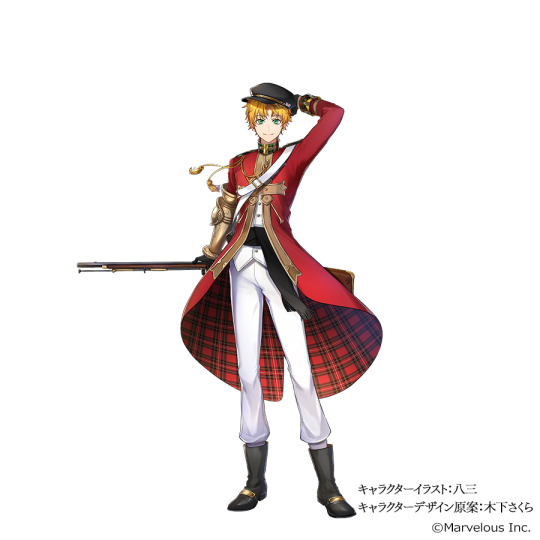
This is George. For the most part. He’s the embodiment of the “cheerful, stupid American” stereotype that’s so common in anime. An all-around sunshine boy, George is good-natured, friendly, sweet, and more than a little oblivious. His main issues come from the fact that he shares a body/gun with the “Brown Bess” personality (the poster boy of the first game). George feels inferior to Brown Bess in both his capabilities as a weapon and his value as an individual, and he repeatedly expresses a belief that everyone around him would rather have his counterpart in his place. Though he tries his best to be good and useful, he’s painfully aware that his existence is kind of a disappointment. He’s way too self-sacrificing for his own good.
. . .
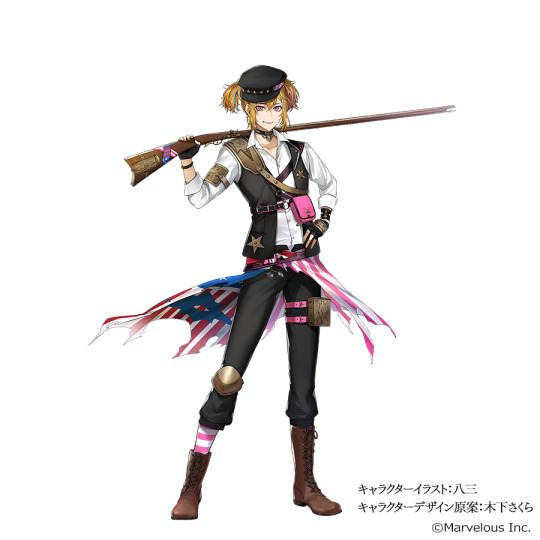
This is Kentucky. He’s more or less an overexcited puppy who REALLY wants to prove himself. Passionate, energetic, and with very little volume control, he’s somewhere between adorably earnest and annoyingly intense. He has a sort of one-sided rivalry with his older brother, Pennsylvania, where he’s aggressively trying to surpass his big bro... while Pennsylvania just wishes they could get along better. Kentucky is also pretty short-tempered; he’s perfectly respectful to his Master but ready to throw hands with other guns whenever the chance arises. He cares a lot about aesthetics and his appearance, wants Master’s attention desperately, and is definitely compensating for a lot of internal insecurity.
. . .
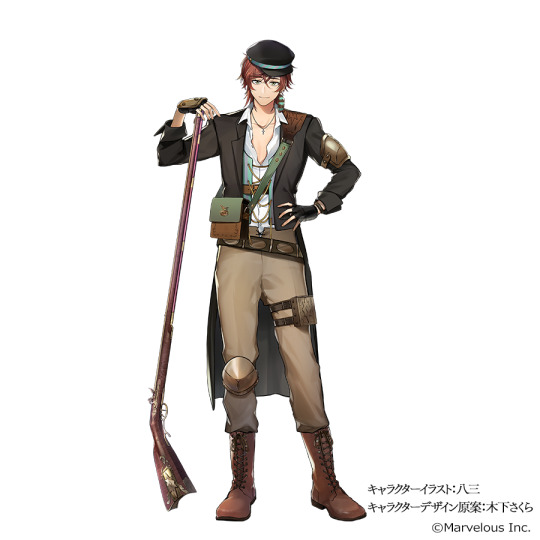
This is Pennsylvania. He’s a laid-back guy with a love of hunting and the outdoors. The level-headed parallel to Kentucky’s hot-tempered enthusiasm, Pennsylvania is calm, independent, and a bit aloof. He can get caught up in his own way of doing things to the point of forgetting about others’ feelings, but he’s well-intentioned and generally kind. A reliable “big brother” type who looks after others, he very much seems like the type who’d willingly get hurt if it meant protecting someone he cares about. He doesn’t have a lot of pride in the sense of how he appears to others and is more concerned with doing what needs to be done than getting his way or looking good.
. . .
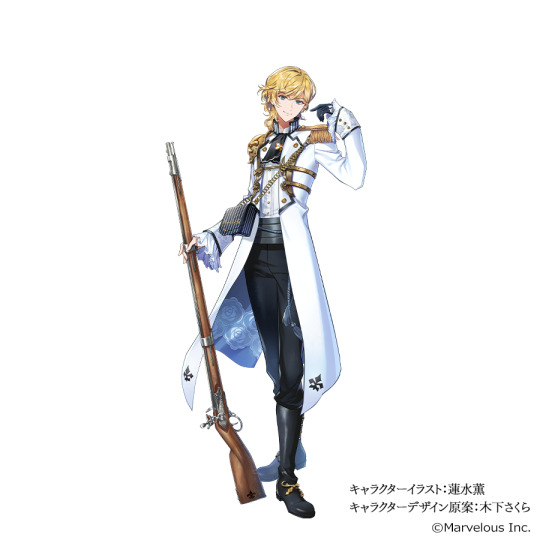
This is Charleville. He’s a sweet little guy who’s very damaged. In the game’s story, his previous Master (before the player owns him) is literally renting him out. For his healing abilities as an Antique, technically, but the more sexual implication is still very much there. Because of this renting out and his previous Master’s general mistreatment, Charleville has an intense fixation on purity, perfection, and being appealing to everyone around him. He’s delicate, gentle, polite, and affectionate, but also has a bad tendency of hiding any problems in an attempt not to bother people. He values his physical appearance and holds himself to a strict standard of behavior, though his more attention-seeking side does slip out from time to time. Charleville desperately wants to be loved, especially by his Master, but he’s convinced he has to be all but perfect to earn it.
. . .
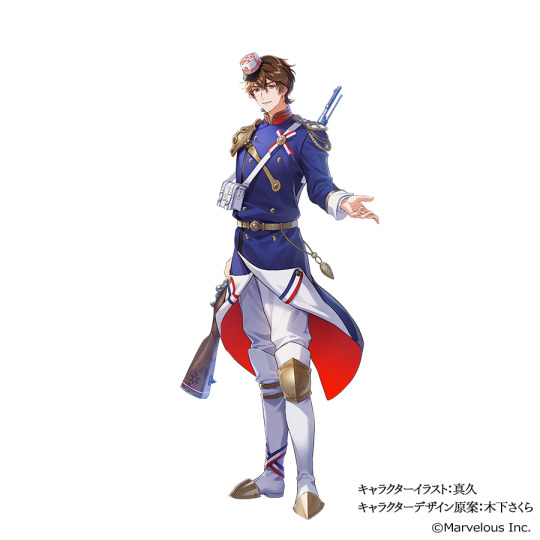
This is Chassepot. He’s Gras’s older brother and the source of MANY of Gras’s problems. Like Gras, Chassepot initially comes across as a polite, charming gentleman. That’s very intentional. He wants Master’s affection and approval desperately and does everything possible to come across as the kind of capable, pleasant person who his Master can rely on and be close to. Under that surface, though, Chassepot is dangerously prone to feelings of jealousy, inferiority, and comparing himself to others. He’s easily provoked and can have a violent temper with other guns, and his past failures haunt him endlessly. It’s likely that he has the same tendency for rabies as Gras, but is just better at keeping it contained... in the short term. We know from the previous game that Chassepot can snap, and when he does, it’s bad.
. . .

This is Tabatiere. He’s a laid-back, inoffensive person who’s perfectly open about the fact that he’s meant for a support role, not the front lines. Usually functioning as Chassepot and Gras’s babysitter, Tabatiere sticks to the sidelines, minds his own business, and tries to be helpful where he can. He’s deeply insecure, however, and his self-esteem is so low that getting too much attention, even positive, makes him highly uncomfortable. He has the atmosphere of someone who willingly accepts anything bad that happens to him because he can’t imagine deserving better.
. . .
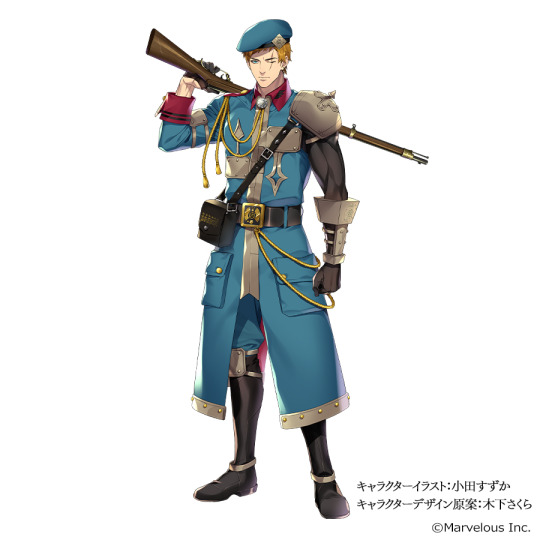
This is Dreyse. He’s an ultra-strict, ultra-serious sort who values rules, order, and hard work. Between his massive body and imposing personality, he comes across as highly intimidating... but he’s as respectful and obedient as can be when it comes to authority figures. Dreyse has high expectations of himself and his performance, to the point where he’ll accept nothing less than perfection. No matter what physical or emotional distress it causes him, he’ll do everything possible to fulfill his orders and succeed as a Musketeer. Deep down, he has a lot of guilt over his past and personal failings, and the only value he sees in himself is as a weapon and tool. Herme respects him massively, and the two are close in a kind of weird way. Dreyse ends up as his caretaker during Iron Days, for example.
. . .

This is Jitte. He has that kind of happy-go-lucky, easygoing personality where he’s both pleasant to be around and kind of a ditz. Very much “drunk goofy uncle” energy. When his self-esteem issues aren’t getting in the way, he can be quite affectionate (especially with Master). Sensitive, earnest, and emotional, Jitte has nothing but good intentions in mind with everything he does. He has the typical bizarre gun insecurity, though, and worries a lot about if he’s as useful and worthwhile as the other Musketeers around him. His gun also functions as a jitte, which is more or less an Edo-period police baton. Though he seems pretty carefree, Jitte is surprisingly hardworking and takes pride in being able to protect people. He’s very moral, with a strong sense of justice.
. . .

This is Karl. He’s a dignified little man who, despite his youthful appearance, is the oldest gun in the series. As in, he’s from the early 1500s. A unique weapon who belonged to Emperor Charles V, Karl has a long and prestigious history, and he knows it. He’s proud and well-mannered, takes his status as a famous piece of history very seriously, and is quite concerned with how he appears and behaves in front of others. Showing weakness is hard for Karl. He does a lot to hide how lonely and weak he can be, including active attempts to remain aloof and relatively unattached to his Master. The most he can tolerate is a professional, weapon-and-wielder relationship, since anything else would be opening him up to even more loss. I think he’s also weak to stress and VERY bad at dealing with unfamiliar situations; being esteemed as a valuable relic for so long means that he’s pretty sheltered and more unused to physical pain than he wants to admit.
. . .

This is Lorenz. He’s kind of insufferable. The mad-scientist intellectual type, he has a massive ego and a superiority complex to match. His type of gun was made in both government and private factories, with the government factory-made ones being notably superior in function— and this Lorenz is one of those. Like a lot of the Antiques, he’s eager and insistent to prove that he’s a useful, high-quality tool, even and especially when that means making himself look good at others’ expense. He’s extremely loyal to Karl, to a kind of pathetic degree... and also absolutely terrified of Dreyse. That leads to the part where Lorenz is very much a coward who’s playing tough in the hopes no one will see through the farce. He’s easily agitated, neurotically stressed, and can’t stand things not going his way.
. . .
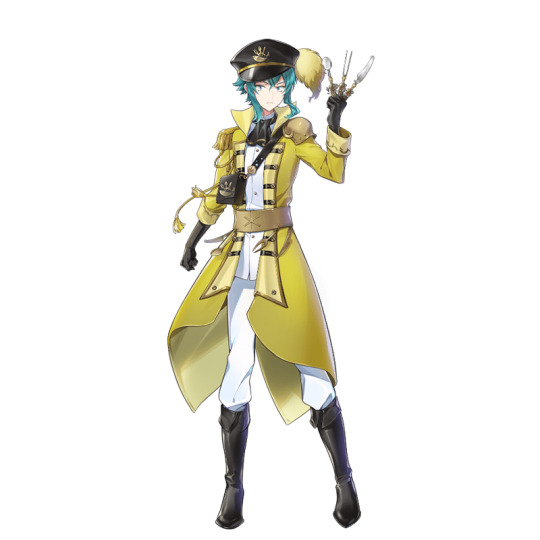
This is Cutlery. He’s a little brat who has the typical bizarre-gun problem of pathetically low self-esteem. His gun is a weird one— it’s technically three guns disguised as pieces of silverware that were used on pirate ships as a covert weapon. Cutlery has a whole complex about how “cowardly” he is, and despite his prickly attitude and initial rudeness, he’s painfully shy, insecure, and unable to handle attention of any kind. He’s prone to idolizing people and desperately wants close relationships, but is too anxious, defensive, and afraid of being hated to open up to people without panicking. That said, he can be awfully needy and clingy once he’s attached. He also has a strong fixation on food, to the point where hoarding behavior and general food insecurity seem likely.
. . .
#Senjuushi#千銃士#Info#Everyone#Enfield#Snider#George#Kentucky#Pennsylvania#Charleville#Chassepot#Tabatiere#Dreyse#Jitte#Karl#Lorenz#Cutlery
70 notes
·
View notes
Text
My Virtual Escape 2 - Chapter 2
On April 1st, 1924, I began to serve my sentence of detention in the Fortress of Landsberg am Lech, following the verdict of the Munich People's Court of that time. After years of uninterrupted labour it was now possible for the first time to begin a work which many had asked for and which I myself felt would be profitable for the Movement. So I decided to devote two volumes to a description not only of the aims of our Movement but also of its development. There is more to be learned from this than from any purely doctrinaire treatise. This has also given me the opportunity of describing my own development in so far as such a description is necessary to the understanding of the first as well as the second volume and to destroy the legendary fabrications which the Jewish Press have circulated about me. In this work I turn not to strangers but to those followers of the Movement whose hearts belong to it and who wish to study it more profoundly. I know that fewer people are won over by the written word than by the spoken word and that every great movement on this earth owes its growth to great speakers and not to great writers. Nevertheless, in order to produce more equality and uniformity in the defence of any doctrine, its fundamental principles must be committed to writing. May these two volumes therefore serve as the building stones which I contribute to the joint work. The Fortress, Landsberg am Lech. At half-past twelve in the afternoon of November 9th, 1923, those whose names are given below fell in front of the FELDHERRNHALLE and in the forecourt of the former War Ministry in Munich for their loyal faith in the resurrection of their people: Alfarth, Felix, Merchant, born July 5th, 1901 Bauriedl, Andreas, Hatmaker, born May 4th, 1879 Casella, Theodor, Bank Official, born August 8th, 1900 Ehrlich, Wilhelm, Bank Official, born August 19th, 1894 Faust, Martin, Bank Official, born January 27th, 1901 Hechenberger, Anton, Locksmith, born September 28th, 1902 Koerner, Oskar, Merchant, born January 4th, 1875 Kuhn, Karl, Head Waiter, born July 25th, 1897 Laforce, Karl, Student of Engineering, born October 28th, 1904 Neubauer, Kurt, Waiter, born March 27th, 1899 Pape, Claus von, Merchant, born August 16th, 1904 Pfordten, Theodor von der, Councillor to the Superior Provincial Court, born May 14th, 1873 Rickmers, Johann, retired Cavalry Captain, born May 7th, 1881 Scheubner-Richter, Max Erwin von, Dr. of Engineering, born January 9th, 1884 Stransky, Lorenz Ritter von, Engineer, born March 14th, 1899 Wolf, Wilhelm, Merchant, born October 19th, 1898 So-called national officials refused to allow the dead heroes a common burial. So I dedicate the first volume of this work to them as a common memorial, that the memory of those martyrs may be a permanent source of light for the followers of our Movement. The Fortress, Landsberg a/L., October 16th, 1924 TRANSLATOR'S INTRODUCTION In placing before the reader this unabridged translation of Adolf Hitler's book, MEIN KAMPF, I feel it my duty to call attention to certain historical facts which must be borne in mind if the reader would form a fair judgment of what is written in this extraordinary work. The first volume of MEIN KAMPF was written while the author was imprisoned in a Bavarian fortress. How did he get there and why?
0 notes
Text
Member tags
Emoji pairs are for tagging and used as signatures.
Harry🌺😈 || AKA: Alfred Ashford, Harry Osborn, Jade Harley, Pizzazz, Yukari Takenba, Lorenz Hellman, Gloucester, Hiyoko Saionji, Iris Watson
Toko/Jack 😼🔪 || AKA: Karl Heisenberg, Akira Kurusu, Toko Fukawa & Genocide Jack, Jeritza Von Hrym, Captain Spinneret Mindfang, Vriksa Serket, Ocelot, Sabretooth, Yuujin Mikotoba
Hal 💻🔪|| aka: Karl Heisenberg, Toko Fukawa & Genocide Jack, Jeritza Von Hrym, Otacon, Otacon. Doug Ramsey, Aranea Serket, Ryunosuke Naruhodo
Akechi 🌀😎|| AKA: Goro Akechi, Xelloss, Nagito Komaeda, Albert Wesker, Cronus Ampora, Kazuma Asogi
Otto 🐙🧪|| AKA: Otto Octavius, Eridan Ampora, Kei Nanjo, Hifumi Yamada, Hanneman von Essar, Enoch Drebber
Chris 💪🔫|| AKA: Chris Redfield, Equius Zahhak, Jean-Paul Beaubier, Balthus von Albrecht, Nekomaru Nidai, Reiji Kido
Hubert 🦇👁|| AKA: Hubert Von Vestra, Bela Dimitrescu, Irene Adler (Marvel), Katsuya Sudou, Nagisa Shingetsu, Inspector Hosonaga
Dirk 🕷😎|| AKA: Ben Reilly, Dirk Strider, Leon Kuwata, Eikichi Mishina, Eric Raymond, mByleth, Phoenix Wright
Kazuichi 🕷🛠️|| AKA: Kazuichi Soda, Leon Kennedy, Robo Dirk Strider, Peter Parker, Junpei Iori, Claude von Riegan, Phoenix Wright
Kotoko 🎀💖|| AKA: Jasmine Harley (Homestuck), Kotoko Utsugi, Chie Satonaka, Pearl Fey
Trevor 🔫🍳|| AKA: Trevor Phillis, Dedue Molinaro, Teruteru Hanamura, Billy Coen, Kurloz Makara, Ryotaro Dojima
Madge 👑🍸|| AKA: The Black Queen (Homestuck), Selene (Marvel), Yukiko Amagi, Manuela Casagranda
Artemy ❄💪|| AKA: Byleth Eisner, Sakura Oogami, Artemy Burahk, Parcel Mistress, General Norst, Yu Narukami, Steve Rogers, The Boss/The Joy (MGS)
Nine 🐸☠️|| AKA: Carlos Oliviera, Ryuji Sakamoto, Daisuke Motomiya, Mortimer Toyenbee, Greg Universe, Aoi Asahina, Carlos Oliveira, Caspar von Bergliez, Sollux Captor
Jake ❤️💪|| AKA: Mondo Owada, Sam Guthrie, Hearts Boxcars, Raphael Kirsten, Akihiko Sanada, Arthur Morgan, Jake Muller Wesker
Nikolai 🧭👑|| AKA: Nikolai Zenoviev, Miles Edgeworth, Seteth, Magneto, Kryuger (Girls Frontline), Kyosuke Munakata
Kirigiri 🔍⚔️|| AKA: Kyoko Kirigiri, Dave Strider, Kitty Pryde, Zelgadis Graywords, Connie Maheswaran, Gentianne, Naoya Toudou, Linhardt von Hevring, Kimber Benton, Takeru Ishida, Tyler Howard
Annette 🔬🐝|| AKA: Annette Birkin, Anna Yoshizaka, Seiko Kimura, Pallas Captor
Akihiro 😼👿|| AKA: Akihiro/Daken, Gundham Tanaka, Naoto Shirogane, James Egbert, Moira Burton, Dorothea Arnault
M16 🔫🦢|| AKA: M16A1 (Girls Frontline), Solid Snake (sort of), Aegis (Persona), Latula Pyrope, Ingrid Galatea, David King
Kaoru ♦🌺|| AKA: Kaoru Saga (Baofu), Diamonds Droog, Peko Pekoyama, Yellow Pearl, Adrien Toomes, Yuri Leclerc, Raymond Vester, Sebastian Moran.
Felix 🐺🦀|| AKA: Felix Fraldarius, Tatsuya Sudou, Ethan Winters, Karkat Vantas, Logan Howlett, Demon Dragon King Gaav, Yamato Ishida, Angelia (Girls Frontline), Franklin Clinton
Rapture ✨🎀|| AKA: Rapture (Jem), Rose Winters, Kanaya Maryam, Rogue (Marvel) Gatomon, Dreamer (Girls Frontline), Eriko Karishima, Celestia Ludenberg, Mercedes von Martritz, Clara (Pathologic), Lapis Lazuli, Tinkerbell
Jane 💀🎂 || AKA: Jane Crocker, Wendy Darling, Fuuka Yamagishi, Betsy Braddock, Springfield (Girls Frontline)
Kurt 👿🎭 || AKA: Kurt Wagner, Ignatz Victor, Jataro Kemuri
1 note
·
View note
Text
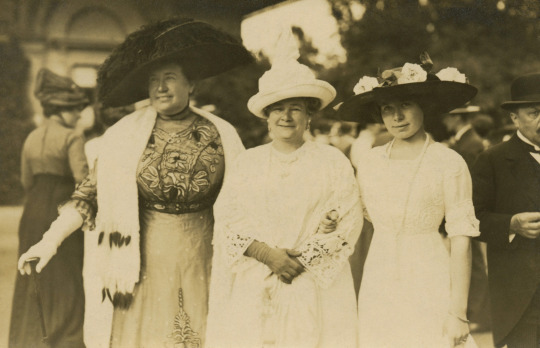

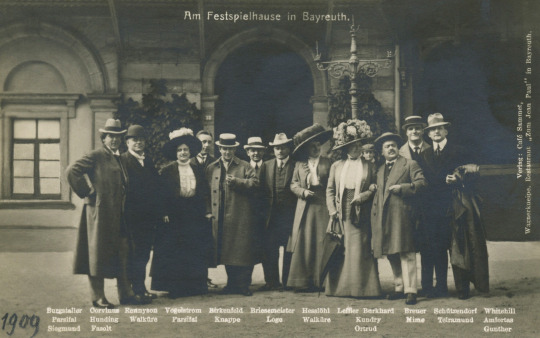

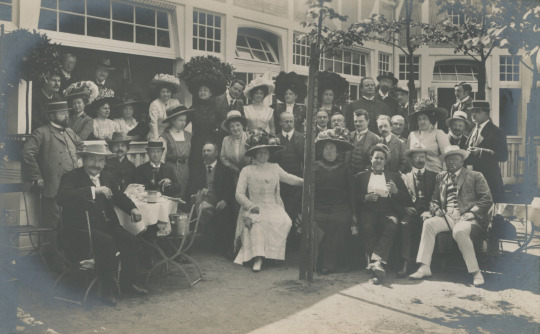
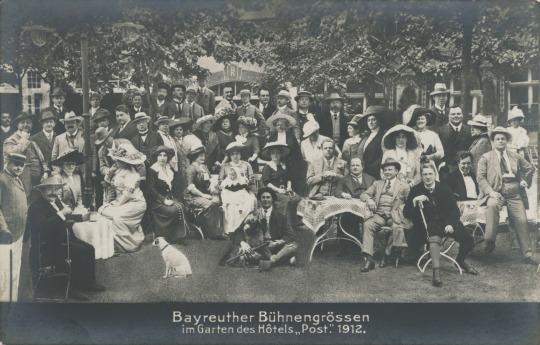

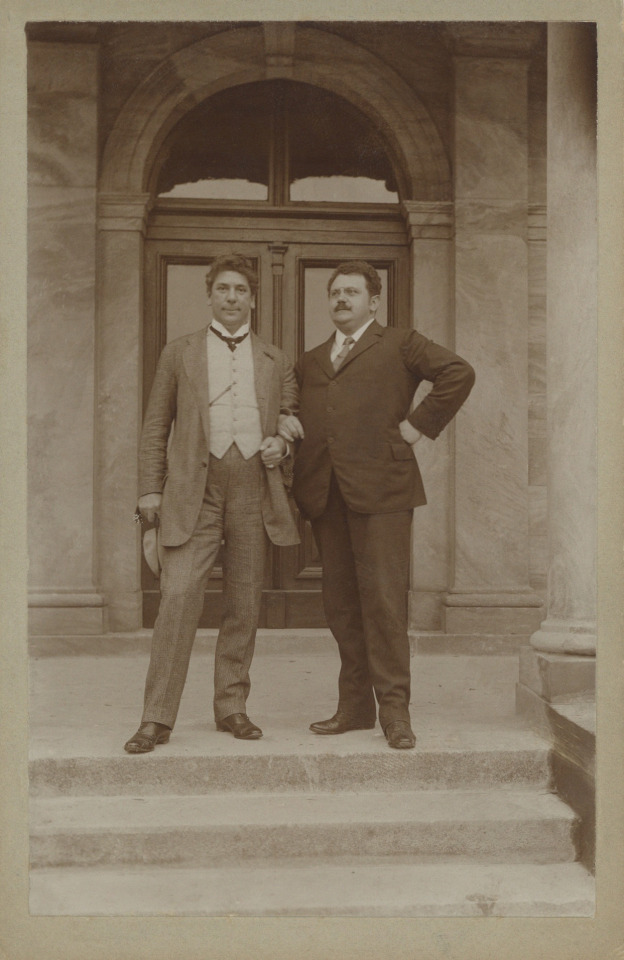

Bayreuther Bühnenfestspiele / Bayreuth Festival
THE SINGERS IN PICTURES FROM THE EARLY DAYS IN THEIR LEISURE TIME TOGETHER.
Ellen Gulbranson, Ernestine Schumann-Heink and daughter; Bayreuth, ?
Hugo Rüdel, Dr. Carl Muck, Anna Bahr-Mildenburg, Clarence Whitehill, Gertrude Rennyson, Lorenz Corvinus, Ellen Gulbranson (daughter), Hermann Bahr, Carl Braun, Fritz Vogelstrom and Marie Wittich; Bayreuth, 1906
Alois Burgstaller, Lorenz Corvinus, Gertrude Rennyson, Willy Birkenfeld, Otto Brisemeister, Emma Hesslöh, Martha Leffler-Burkhart, Hans Breuer, Alfons Schützendorf and Clarence Whitehill; Bayreuth, 1909
Karl Kittel, Hans Breuer, Alexander Kirchner, Rudolf Moest, Nikola Geisse-Winkel, Carl Braun, Ellen Gulbranson, Alois Burgstaller, Lily Hafgren-Waag, Lorenz Corvinus, Louise Reuss-Belce, Marie Wittich, Käthe Neubeck, Wilhelm Fenten and Otto Brisemeister; Bayreuth, ?
Lily Hafgren-Waag, Elsa Band-Agloda, Ellen Gulbranson, Fritz Vogelstrom, Nikola Geisse-Winkel and others (Could you identify all the singers?); Bayreuth, 1909
Ellen Gulbranson, Anna Bahr-Mildenburg, Ottilie Metzger-Lattermann and others; Bayreuth, 1912
Siegfried Wagner, ? Wieking, Ernestine Schumann-Heink, Eduard Habich, Michael Bohnen, Franz Stassen (illustrator), Prof. Khnopff (?), Hans Breuer, Winifred Wagner and others. Restaurant "Eule", Bayreuth, ?
Alois Burgstaller and Walter Soomer; Bayreuth 1897
Alois Burgstaller, Hans Breuer, Max Schlosser and Hans Schütz; Bayreuth 1896
#classical music#opera#music history#bel canto#composer#classical composer#aria#classical studies#maestro#chest voice#Bayreuther Bühnenfestspiele#Bayreuth Festival#classical musician#classical musicians#classical history#opera history#historian of music#history of music#musician#musicians#diva#prima donna
5 notes
·
View notes
Note
Do you have more boars and/or hogs
tons!

Karl Bodmer

unknown artist

Peter Jackson


Wilhelm Lorenz



Rosa Bonheur


Georges Rötig
#suidae#boars#Karl Bodmer#unknown#Peter Jackson#Wilhelm Lorenz#Rosa Bonheur#Georges Rötig#replies#boars are a really popular art subject so i could literally hand these out all day#requests
355 notes
·
View notes
Text
Senjuushi R Valentine Card gifting [Antique guns]
A continuation of this post.
George
My world has really changed ever since the moment Master have summoned me.
I'm really lucky to have met you, Master!
Jitte
It makes me happy to receive a formal card. Thank you, Master.
I swear to become a man who can protect you from now on.
Chassepot
Thank you for the card, Master.
In return, I present you a bouquet of 99 roses.
I hope you can find the meaning behind it.
Charleville
I cannot possibly express my gratitude. I hope that staying by your side with a smile on my face will be enough to return the favor.
Tabatiere
You can't do this, Master-chan. You should gift such wonderful things to someone who is more reliable. But... aah, I'm so happy!
Enfield
I'm so excited to receive a card from you! Of course, I also prepared one for you.
Now, please take it.
Snider
You don't need to use Valentine's as a reason to stay with me if you want it.
Now, be more honest with yourself.
Pennsylvania
Thanks for the card. A necklace as a thank-you.
A day of doing romantic things is not something I am used to, but it's fun.
Kentucky
Master, I have one request for you... can we wear matching shirts and go out together?
I'd like to try somethin' like that!
Dreyse
Mhm. Thank you for the card.
Since today is a lover's day, I tried to make a heart-shaped wurst. What do you think?
Karl
Ohho! A card and a chocolate.
Hm... I see... Hmhm. I have a feeling that a chocolate received from you will be especially tasty.
Lorenz
Let’s give chocolate to the guinea pig*.
Out of 6, 1 contains sleeping medicine, 1 contains a laughing pill, another one... I look forward to you trying it.
*guinea pig here refers to a human guinea pig, an experiment subject
#senjuushi#senjuushi antique guns#senjuushi george#senjuushi jitte#senjuushi chassepot#senjuushi charleville#senjuushi tabatiere#senjuushi enfield#senjuushi snider#senjuushi dreyse#senjuushi pennsylvania#senjuushi kentucky#senjuushi karl#tzago translates#千銃士#千銃士r#senjuushi lorenz
20 notes
·
View notes
Photo

Chibis of Karl, Lorenz & Belger from Senjyushi Rhodoknight
Source
6 notes
·
View notes